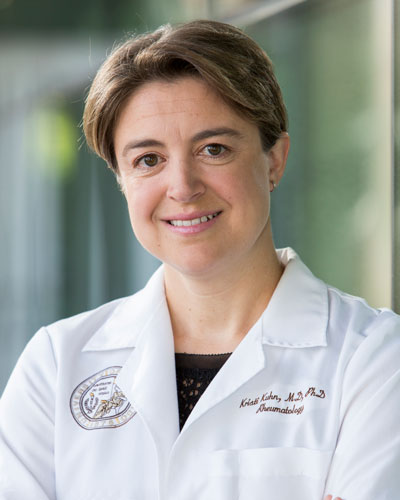Animal Model
The Animal Model Program provides the following expertise and services:
- Consultation and training in developing animal models of inflammatory injury of the GI tract and liver
- Consultation and service in the generation and breeding of various Cre-lox transgenic strains of mice
- Veterinary pathology consultation, service and training on the depletion of various populations of immune cells in mice
- Initial service, consultation and subsequent training for isolation of various populations of immune cells of the GI tract and liver
- Access to the Institutional Histology Program and consultation on the interpretation of histological tissues and the evaluation of gut and liver pathologies
Animal Model Collaborations
- Animal models (tissue-targeted KO and GI/liver disease models)
- Leukocyte sub-population depletion strategies
- Targeted cell isolation from the espophagus, liver and intesting
- Histopathology
- Germ-free (gnotobiotic) mouse facility
Directors

Kristi Kuhn, MD, Phd
Dr. Kristine Kuhn’s clinical and research interests are related to spondyloarthritis with a special emphasis for those with overlapping Inflammatory Bowel Diseases (IBD). Research has shown that 30-50% of patients with spondyloarthritis will develop bowel inflammation and about 50% of patients with IBD develop disease outside of the intestines that affects their eyes, skin, and joints, which prompts consultation with a rheumatologist. Treatment options for patients with IBD-associated arthritis are extremely limited compared to what is available to those with rheumatoid arthritis.
The overarching hypothesis of Dr. Kuhn’s research program is that specific microbe-mucosal interactions influence the generation of systemic inflammation and the autoimmune diseases spondyloarthritis and rheumatoid arthritis. This pathogenic process develops through stimulation of locally-generated proteins, metabolites, or cells in the correct genetic setting. Multiple lines of evidence suggest that autoimmune disease may result from microbial-mucosal interactions. Microbial dysbiosis occurs in new onset seropositive rheumatoid arthritis and in established spondyloarthritis; however, the causal relationship between microbiota and disease is unknown. Dr. Kuhn’s lab aims to identify these causal relationships to understand disease pathogenesis and to reveal novel treatment targets in these diseases.
